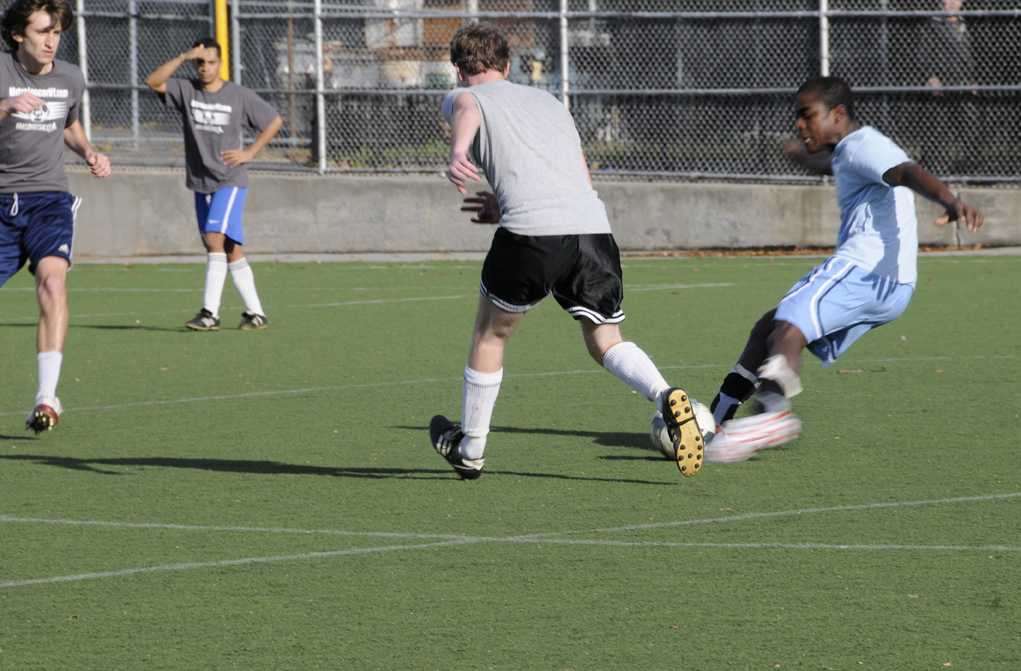With a New Sense of Determination, FCLC Soccer Has Quietly Become One of Fordham’s Best Teams
July 9, 2011

Published: April 15, 2010
Joey Carnevale, Fordham College at Lincoln Center (FCLC) ’11, seems angry. He’s very polite, very eloquent. But when he remembers the game, his words become sharp. He speaks slower. He takes a moment to think about what he’s saying. Greg Palmer, FCLC ’11, finally admits it. “It made me angry. It reminded me of last year.”
They’re talking about the last game they played for the Fordham Lincoln Center soccer team, a 1-1 tie versus Gotham on March 28. “I feel like we were the better team. We missed a lot of chances,” said Palmer, who along with Carnevale and Luiz Loures, FCLC ’11, is now a captain. “I think if we played them again, we’d come out on top,” he said.
FCLC soccer, which plays in the Metro Soccer N.Y. Bryant High School South Division, had been 3-0 until the tie, posting an impressive +17 point differential and winning each of the previous three games by at least four goals. In a single game, they have scored more goals (eight) than they have allowed in the other four games combined (six).
This success comes after a year where the team went undefeated but stumbled at the end of the season, tying its last four games before the league championship. The finals ended in a tie which allowed the other team to be crowned league champions based on the league’s tiebreaker, the point differential.
“It was a bad feeling losing the championship like that. The last game really left a bitter taste in my mouth,” Palmer said. “We don’t want anything like that to happen again.”
A few years ago, the thought that the team would come anywhere close to the league championship was about as believable as saying the best sports team at Fordham is from Lincoln Center. The team was one of the league’s perennial basement dwellers who could always be counted on to boost the other team’s points differential. The players on the team saw soccer as a way to get some exercise and maybe have a little fun, but this laissez-faire attitude kept the players from putting in the work that was required to win.
“The players didn’t really take it very seriously,” Carnevale said. “It was definitely more about having fun than winning.”
The team would rarely hold practices, and the few times there were practices, they were poorly attended. Due to the lack of practices, the team lacked the cohesion and communication necessary to stop mental errors. In addition, the practices were held in Central Park, where there is no soccer field, forcing the team to practice on small sections of grass. Without a real field, many of the practices ended up just becoming free form scrimmages without any strategy.
But when the new team captains inherited the team, they made a concentrated effort to make the team more competitive. They set up a weekly Thursday practice at Riverside Park, which contains full length soccer fields. They stopped just short of making practices mandatory, instead strongly urging everyone to attend. The soccer fields allowed the practices to expand beyond just small scrimmages, giving the team a chance to practice specific soccer situations such as corner kicks.
“Before our practices were kind of scattered and unorganized,” Loures said. “But now we get a lot of good work in. We can practice strategies like where to stand on corner kicks, something we couldn’t do before.”
They were also helped by an influx of international students who have been playing soccer their whole lives and better understand the game. These players come from countries where soccer is not just a sport but a lifestyle.
“I’ve got to credit some of our improvement to the fact that we’ve been able to get some international players. We’ve gotten a few [international players] who are really good,” Carnevale said. “We have a Russian player and a Brazilian player who make up our junior attack, which is one of the strengths of our team.”
The more concentrated practices and better players allowed the captains to instill the soccer formations and strategies that allowed the team to develop chemistry and work together more fluidly, like the 1-3-3-1 formation, which focuses on defense by trading one of the usual two strikers (a player who plays closest to the other team’s goal and concentrates only on scoring) for a midfielder (a player who is equally responsible for offense and defense). The formation allows the team to take advantage of its great defense, which all three captains say is the essence of their team, and the reason for their success.
While the team’s dominance is a well kept secret at Fordham, the other teams in the league have certainly taken notice.
“It’s great to play against teams that used to beat us so badly, and all of a sudden we’re blowing them out,” Carnevale said. “They look at us like, ‘Who are these guys?’”
They’re just Fordham’s best sports team.









